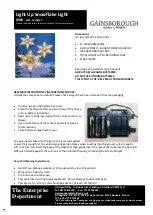
Section 1: VP-ITC System Introduction
1.6 Pipette Assembly
The pipette assembly consists of the injection syringe with pre-mounted top syringe clamp, a
bottom syringe clamp, the syringe holder and the pipette injector.
!
Caution: At all times when handling the injection syringe you want to use care to
prevent the long needle from any action that may cause it to bend. If the long needle is
bent far enough it will become a permanent bend that will make the syringe unusable
for any experiments.
!
Caution: Never attempt to couple/decouple the pipette from the syringe assembly unless
the pipette plunger is in the open port position (all the way up). Failure to follow this
recommendation may result in a bend in the pipette screw. Even a slight bend will
result in improper operation of the pipette.
To assemble the pipette, please do the following (please refer to diagrams on next page):
The height must be adjusted for any syringe that was not part of the original shipment of your
VP-ITC instrument. Please refer to
Section 5.4 Replacing Injection Syringes & Height
(page 74) for instruction on adjusting the height of the syringe.
•
Insert an injection syringe into the syringe holder till the top syringe clamp is firmly seated
against the top of the syringe holder. (see diagram next page)
•
Insert the bottom syringe clamp over the syringe needle onto the glass part of the syringe.
9
















































